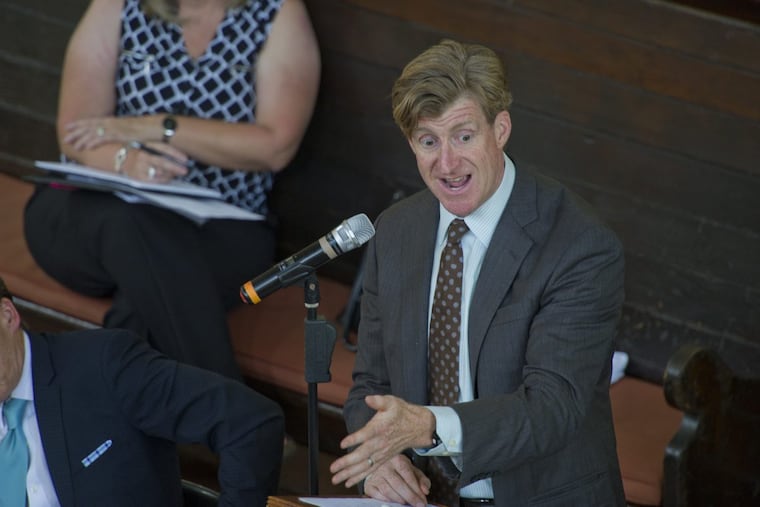Will anti-marijuana Democrats hold back legalization in New Jersey and Pennsylvania? | Philly 420
Although the national Democratic Party adopted a "pathway to legalization" for marijuana in 2016, some key figures holding up reform carry a "D" after their political title. A few have launched pointed challenges to their own party's efforts in an attempt to keep the war against cannabis consumers from going cold.

Republicans like N.J. Governor Chris Christie and U.S. Attorney General Jeff Sessions are the most hyperbolic opponents of cannabis on the national stage, but it's Democrats who are helping build final barricades to defend local marijuana prohibition.
Although the national Democratic Party adopted a "pathway to legalization" for marijuana in 2016, some key figures holding up reform carry a "D" after their political title. A few have launched pointed challenges to their own party's efforts in an attempt to keep the war against cannabis consumers from going cold.
After a personal struggle with alcohol and prescription drugs, former Rhode Island Congressman Patrick Kennedy co-founded Project SAM, the only national group focused on fighting marijuana legalization. But now Kennedy has been appointed to cannabis-positive N.J. governor-elect Phil Murphy's transition team.
Kennedy's approach to cannabis consumers is simple: Treatment or jail. To say he is firmly against legalization would be an understatement. His active presence in Trenton at a critical moment for the future of marijuana in the Garden State could be a significant factor in delaying the passage of any law.
Remember, folks: With more than 25,000 annual possession arrests, New Jersey is putting about 70 people into handcuffs every day for small amounts of weed.
Kennedy and former Obama administration drug enforcement expert Kevin Sabet have crisscrossed the country for years professionally lobbying state and federal legislators. Their strategy is to stall, slow or defeat any legalization bill or ballot referendum. With remarkable persistence, their impact has resulted in heavily restrictive medical cannabis laws that fail to deliver anything tangible.
Kennedy and Sabet are lifelong Democrats with a deep network within the party. The pair are often featured in the press and as speakers at government policy conferences. By heading up the only organized opposition to marijuana and spending millions per year to defeat legalization in politics, they have acquired uneven clout.
The duo are also darlings to anti-marijuana Republicans. Republican Pennsylvania state Rep. Matthew Baker, one of the fiercest opponents of the medical cannabis bill, thanked Kennedy's group during a floor speech in 2016.
Still, Kennedy isn't alone and he finds the best traction for his brand of prohibition on the blue side of the aisle.
New Jersey state senator Ronald Rice and Assembly Speaker Craig Coughlin, well-known Democrats, have come out in the days since Phil Murphy's election win to announce their desire to put legalization on a slower track. Coughlin fears some of the finer points of the bill and Rice has expressed concerns about long-disproven marijuana myths.
Notably, it was Assembly and Senate Democrats, holding the majority in Trenton and with Jon Corzine in office, who delivered a medical marijuana law allowing only six dispensaries, two ounces for patients per month and no home cultivation. That was back in late 2009, and today most of the same people are still in office.
Governor-elect Murphy and his transition team may not recognize how disappointing and alarming Kennedy's appointment has been among the cannabis community. Although balanced by Roseanne Scotti at the Drug Policy Alliance in New Jersey and Amol Sinha at ACLU-NJ, there is no marijuana-specific person on Murphy's list.
And Democrats are putting up hurdles on both sides of the Delaware River.
Mayor Wally Scott of Reading, Pa. walked out of a City Council meeting in October after a vote that encouraged a statewide marijuana decriminalization effort. Scott's animated outrage made a national news blip, along with a follow-up Facebook video of the good Mayor laying out his concerns, many straight out of 1936. Without any local support for his weed tantrum, Scott crossed party lines and attempted a run straight to the top, airing his grievances to President Trump. He did not receive a response.
Perhaps Scott hasn't heard that the PA Democratic Party adopted a clear approach to marijuana legalization in the state platform. That means anyone running for office as a Democrat should be supporting the issue.
But, most confusing, especially in light of the Pennsylvania party platform is Governor Tom Wolf, who is fast-approaching a November 2018 re-election bid. Wolf is a strong supporter of the concepts of social justice and he is familiar with the problems with criminalizing cannabis. The Governor has spent a lot of time cheerleading Pa.'s extremely limited medical cannabis program. But, when it comes to selling joints in Philly and collecting the prodigious tax revenue, Wolf is stuck in a well defined position of "wait and see."
Cannabis brings voters to the polls and Wolf should be taking a hard look at Phil Murphy's win in New Jersey.
The anti-cannabis Democrats are entitled to their opinions, though they are held by an ever shrinking number of Americans. There is ever-increasing support for the plant — now more than 60 percent of voters are in favor of legalization. In fact, no politician can compete in popularity with cannabis.